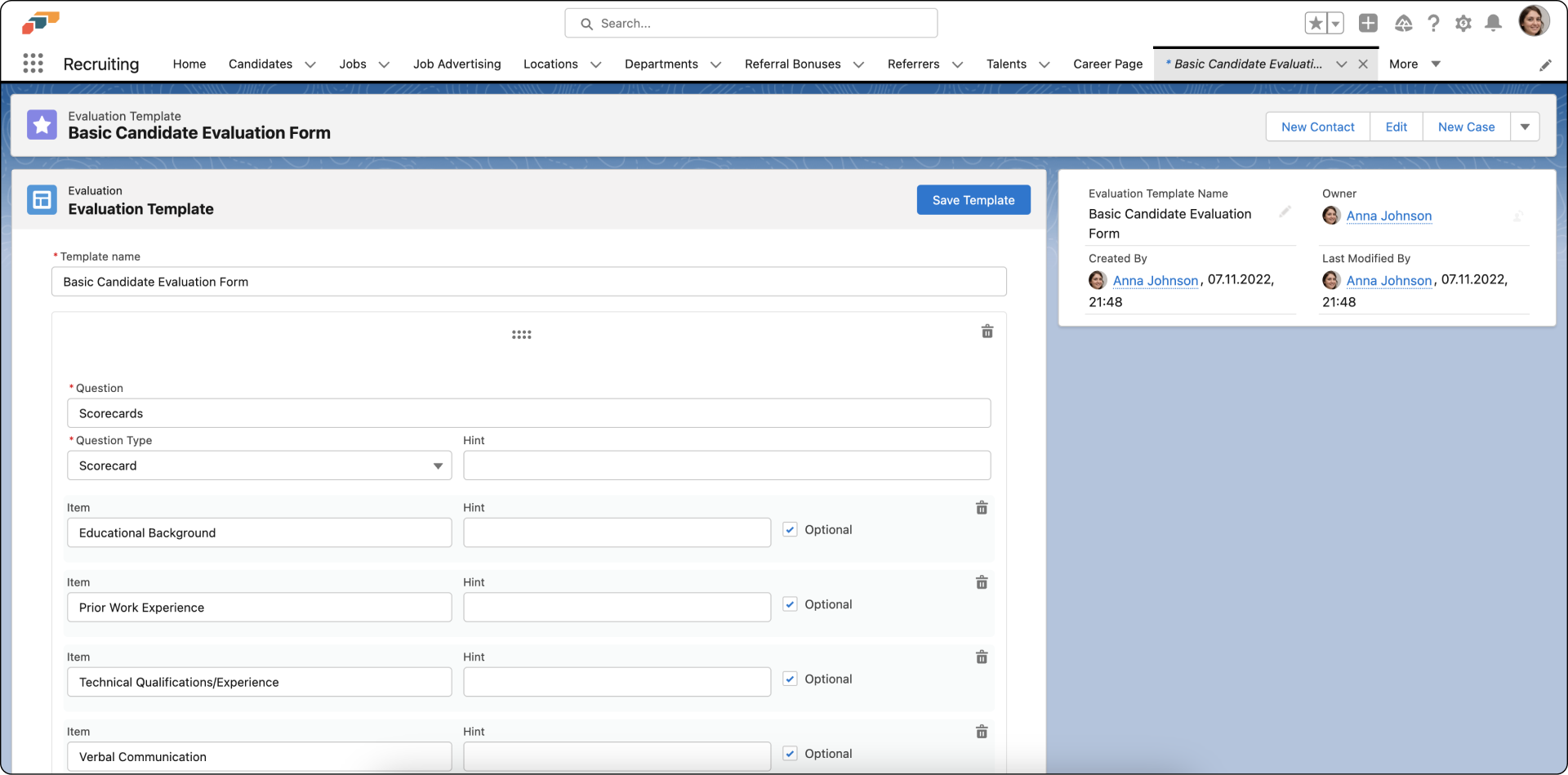90 Hiring Statistics: Challenges, Strategies, and Trends
Discover key strategies for successful hiring. Learn how to attract top talent and build a winning team effectively, based on current research and statistics.
- 30 Jan 2025
- Max 12 min read
The Number One HR Solution on Salesforce
Conducting a successful interview affects almost every aspect of your business.
Put more clearly, finding the right candidate starts with the interview process, which will affect teamwork, company culture, and productivity, to only name a few factors.
Even though this blog post is aimed at helping HR professionals, it could also be an excellent place to start if you’re a potential candidate preparing for an upcoming interview.
In this article, we’ll work through all the steps, from choosing a potential candidate to cheat-sheet interview questions.
A potential candidate is someone who is being considered for a position at a company. On the other hand, high-potential candidates are individuals that demonstrate the ability to grow faster (generally with more success) than the average potential candidate.
Finding a high-potential candidate is the goal, of course. However, this may not always be as easy a task as it may seem. Nonetheless, this is where the interview process starts and is, thus, a crucial step to finding the right candidate for the position.
There are various steps to follow to evaluate your potential candidates better, and we’ll get to these in a moment. However, finding them is the first and most crucial step.
Let’s say you’re a marketing and communications agency looking for a potential junior candidate; the competition to find a great junior candidate is already very high. Most likely, you’ll be flooded with resumes and CVs after posting a general job description on LinkedIn.
This outcome will be the same for every marketing and communications agency looking for a junior candidate.
However, if you post a job ad describing to potential candidates precisely what the job entails, requirements, and other qualifying factors, you’ll most likely get fewer applications.
The key takeaway is that getting fewer job applications isn’t bad; this is actually the first step to getting higher-potential candidates.
Employee retention is an obvious goal for most companies; ensuring your potential employee fits in with the company culture is essential to employee retention.
Thus, if you already have high-potential employees demonstrating the company’s culture daily, why not make them part of the interview process? After all, these high-potential employees will be working with them in the future.
High-potential candidates with a specific job title at a particular company know what it takes and what skills are essential for other candidates to have. Accordingly, it might be a good idea to get current high-potential employees onboard when interviewing or sifting through the CVs of potential candidates.
It can be effortless to be a great candidate during an interview but not a great candidate for the actual open position. Accordingly, it might be a good idea to have a trial period for each employee to better get to know the company's operations and vice versa.
Conducting successful interviews with potential candidates is no easy task. This is why we’ve compiled a list of the necessary steps to run a successful interview, and we’ve listed these steps in chronological order for your convenience.

After receiving multiple job applications, scheduling interviews with all potential candidates may seem daunting. First of all, this process doesn’t need to be all that bad if you use an Applicant Tracking System (ATS) to help you track potential candidates throughout the hiring process.
An initial screening process is a good place to start, especially if you’ve received a lot of applications.
Here you can confirm that each potential candidate has the minimum qualifications required for the job opening while not wasting company resources on thousands of interviews.

It is essential to have a job profile that includes background and personal factors. This will help you decide which candidates should move forward in the hiring process.
After selecting high-potential candidates for the position, it’s crucial to allow the qualified candidates enough time to prepare for the interview in advance. The general rule of thumb is at least two days before the interview. Furthermore, when scheduling the interview, it’s best to be as accommodating as possible by providing all the necessary information the potential employee might need.
For example, will the interview be held online or in person? Is there a meeting link? Where can the potential employee park for the interview? If there is a dress code, let the prospective employees know.
Another good idea is to describe the interview format to the potential employee. For instance, letting them know how many interviewers will be present, the expected interview time, or just general interview objectives can make the whole process smoother.

Prepare for the interview by evaluating the current open position while reviewing the candidate's resume a few times more. While doing this, consider the needs and requirements for the current position and compare these with the candidate's profile. This will allow you to create intentional interview questions.
We will discuss some examples of situational, behavioral, and our favorite fun questions to incorporate into your interview. Allow yourself enough time to compile a list of relevant questions appropriate to the advertised position.
It might be helpful to find a way to score each interviewee with the help of a scorecard, especially if you’re interviewing multiple candidates. Furthermore, this will simplify the process of taking notes during the interview and help you stay organized.
Note: Ensure all the interviewers are on the same page about the applicable scorecard before the interview process starts. If there are multiple interviewers, each interviewer will receive a scorecard to fill in for every candidate.
Here are some things that are essential to have on each scorecard:
One of the easiest ways to keep score is using a scale for each planned question. As a general rule of thumb, these are some factors that are a good idea to include in the scorecards.
Be prompt by showing up on time and prepared, whether the interview is conducted in-person or online. Welcome the potential candidate and try to make them feel comfortable.

This is the step where you do reference checks to see if everything the candidate has shared is, in fact, true. A good idea is to call or email the potential candidate’s reference and ask the following question: “Would you hire this candidate again?”
Last but certainly not least is the end of the interview. This is a very subtle but important thing to do to leave potential candidates feeling good about your company culture.
Thank the potential employee for their time and walk them to the exit as getting lost in a new environment is easy.
Also, this will prevent the potential candidates from feeling embarrassed.
Additionally, it is crucial to send a follow-up email to every potential candidate, whether it be a job offer or a job rejection email. By doing this, you’re avoiding the chance of job candidates posting negative reviews about your company’s interview process.
A huge part of having a successful interview is to be aware of the right techniques at your disposal to use during the interview.
Let’s start by defining some of the qualities of a good interviewer. These are some things that are non-negotiable and will play a vital role in conducting a good interview with a potential client. Even though some of them may seem obvious, it is important to take these qualities to heart to ensure the success of your interview.
The following techniques aren’t necessarily ones you should write down and make part of your structured interview. But instead, these are techniques to keep in mind throughout the process. Hopefully, these techniques will help you to guide the process.
The STAR method is a technique that can be used by both interviewers and interviewees.
This method is used to answer questions thoroughly or, if you’re an interviewer, to listen carefully and to notice if there is information missing in the answers that your candidates are providing. By doing this, you can better guide the interviewee and the process in general. This method is an excellent way to respond to behavioral-based interview questions. The action step is especially important when you’re an interviewer.
STAR is an acronym for the following:
Action - Action relates to the specific action the potential candidate took to reach the goal. This is where the STAR method becomes truly useful other than guiding the process. If the potential candidate doesn’t provide enough information about any of the steps, you can simply ask them to elaborate.
However, if the candidate cannot elaborate on the action they took to achieve the goal at hand, it is likely that the candidate didn’t actually participate in that task. This is because when someone has struggled with a task, they can usually tell you exactly how they resolved the situation.
On the contrary, if someone says they participated in a task but cannot give enough information as to how they attained their objectives, it is most likely that the candidate may not be telling the truth.

Even though reviewing candidates’ CVs may seem obvious to some, it is a point that cannot be left out. Shortly before the interview, it is always a good idea to review each candidate’s resume in order to have them clarify some areas of uncertainty, like, for example, employment gaps.
Good interviewers know how important it is to make potential candidates at ease during the interview, as this will help them pick the best fitting candidate for the job. So the question remains, how exactly does one help potential candidates feel comfortable?
The answer to this question is simpler than one would think. First of all, it is important to treat the interview as a conversation, meaning don’t come off as confrontational.
Additionally, it is often a good idea to start the interview with a few easy questions like “how is your day going?” while slightly increasing the difficulty of the questions as you go about the interview. This will help the interviewees gain confidence while making them at ease before arriving at the difficult questions.
These questions weren’t compiled with a specific group in mind, but rather, they could be used as inspiration when coming up with interview questions.
For your convenience, we’ve divided the questions into behavioral and fun interview questions.
Behavioral questions, also known as situational questions, are questions aimed at understanding how a potential candidate acted in a specific situation.
Furthermore, these questions aim to understand how candidates conduct themselves in a professional environment, what their skill levels are, and how they handle stress, for example. As discussed, it is important for candidates to use the STAR method to answer behavioral interview questions appropriately.
As mentioned above, the answers of the potential candidates should contain the problem they faced, the solution, and the benefit to their previous employer. Let’s take this question as an example: “Describe a time when you had to work with a difficult coworker?”
Here is an example of a correct answer to this question:
Here is an example of a bad answer to this question:
When comparing these two answers, you can clearly see that both situations were the same, but how the candidates handled them was very different. With behavioral types of questions, you should look for the underlying soft skills of each candidate and consider if that matches your job profile.
Fun or funny types of interview questions are a great way to start the interview as they will lighten the mood while interviewers can get a sense of your true personality (and if it will fit with the company culture). Furthermore, interviewers can use these questions to determine if potential candidates can think on their feet while getting the conversation going.
You can interpret the answers in any way, depending on the job profile candidates are applying for.
However, interviewers should try to focus on the thinking process of candidates to gain insight into their critical thinking abilities of interviewees. Furthermore, these questions can be used to encourage more honest answers. So, without further ado, here are our favorite fun interview questions.
The candidates should give the interviewer insight into their strengths when answering this question. The candidate could choose any type of animal, but it is important that they state, “because we are alike in the following ways.”
By asking this question, interviewers can see how thoughtful candidates are.
This question will reveal the true motive of the candidates. Employers don’t only want an employee to fill the role, but they want someone to find genuine fulfillment in the role.
Ultimately, you don’t want to hire someone who is solely interested in the money as better engaged employees generally perform better compared to employees who are not.
In conclusion, effectively interviewing a potential candidate using a structured list of questions can ensure that any areas of concern are exposed. The preparation that goes into interviewing potential employees and making them feel comfortable during the whole process is what makes people good interviewers.
Hopefully, you feel inspired by our small list of questions and prepare for those upcoming job interviews!
Join flair’s newsletter to receive the latest tips & trends in the HR world.

